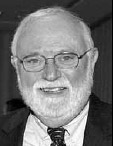
December 1, 2016
Dr. Tom Durant, the man the late Boston Globe columnist Dave Nyhan once called the “bantamweight archangel,” has been gone now for 15 years, but his legacy is very much alive.
The Dorchester physician found his medical anchor at Massachusetts General Hospital; his calling was bringing medical care to suffering people throughout the world.
In 1966, Durant began his humanitarian efforts as a medical adviser for refugees in war-torn Saigon. Over the next 35 years, his mission took him to Cambodia, Northern Ireland, Kosovo, Central America, Bosnia, Rwanda, Somalia, the Iraq/Turkey Border, and Afghanistan. This self-described “simple boy from Dorchester – with a passport” always wore his Boston Red Sox cap as he made his global rounds.
In 2011, his friend Joe Leary said, “Tom Durant brought happiness and comfort to thousands, even tens of thousands, during his lifetime. Tom had gifts that few of us have. He could be tough as nails taking on authority figures who didn’t pay enough attention to the weaker and poorer among us. And he was a humble man, frequently taking the overnight shift that everyone else avoided. He was the first to say, ‘I’ll go’ when a disaster of any kind presented itself… Yet throughout his life, a bright sharp humor came forth with every step he took. Smiles and laughter lay in his wake wherever he traveled.”
Before he died, MGH established the Thomas S. Durant Fellowship for Refugee Medicine, annually selecting a staff nurse or doctor as a “Durant Fellow” to work in a far corner of the world where the need is great. Fellows receive a stipend and expenses, and work 3-9 months with existing organizations in response to acute humanitarian crises.
The 2016 Durant Fellow, Dr. Rachel Lampros, is a physical therapist who worked in Haiti, “the poorest country in the western hemisphere where 80 percent of Haitians live under the poverty line and 54 percent live in abject poverty,” she said in a report to Fellowship supporters. “There is no public health infrastructure making access to basic healthcare impossible for the majority. Half of the children in Haiti are unvaccinated and more than 10 percent die before the age of five. Mothers provide two numbers when asked how many children they have: how many born, and how many living.
“This October, I embarked on my third trip to Haiti, my first trip as a Durant Fellow, revitalizing my purpose and polishing my practice,” Lampros wrote. “When we arrived, [hurricane] Mathew was still a tropical storm warning. Our team anticipated some rain, road closures and flooding; a recipe for inconvenient travel days at worst.
“Unlike the States where we were inundated with latest satellite imagery on Matthew’s trajectory, there was little to no awareness that we were on the threshold of possible disaster. Despite closing the clinic for the day, we were swarmed with patients seeking medical attention. We triaged the patients that required emergent care and sent the remainder home emphasizing the severity of the storm. Projected winds of 145 mph and 25 inches of rain meant our neighbors living in tin sheds and tents would literally be swept away.
“The forecast was devastating. After Matthew decimated the southern peninsula, it took a hard westward turn away from our clinic. We sustained little to no damage and minimal surge. Our community was spared and our clinic reopened.
In the wake of Hurricane Matthew, this devastated country will become even more vulnerable to disease outbreaks and less equipped to manage its long-term sequelae. As more post-hurricane relief efforts respond and the devastating aftermath of the hurricane manifest, our work in Haiti surges to the forefront.
“It is a privilege to represent the fellowship and to serve the victims of humanitarian disasters in our life, garnishing the spirit of Dr. Thomas S. Durant.”
For more on the Durant Fellowship, contact its director, Dr. Larry Ronan, at lronan@partners.org.

